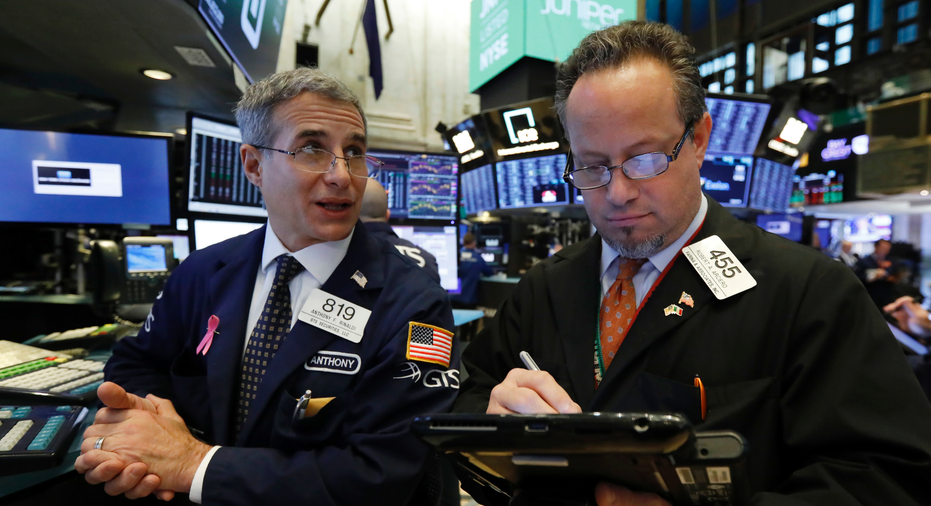Stocks skid as tech companies fall; oil plunge continues
Trader Vincent Napolitano, left, works on the floor of the New York Stock Exchange, Friday, Nov. 9, 2018. Stocks are falling as energy companies are dragged lower by the continuing plunge in crude oil prices. (AP Photo/Richard Drew)
NEW YORK – U.S. stocks fell Friday as a combination of weak economic data from China and disappointing earnings hurt technology and internet companies. Crude oil prices fell for the 10th day in a row.
Auto sales in China fell in October for the fourth month in a row and are down 13 percent from a year ago, the latest sign its economy is under pressure. Concerns about China's economy and its trade dispute with the U.S. contributed to the global stock market skid in October. The stocks that fared the worst during that time included tech and internet companies and retailers, which all took sharp losses Friday.
"China has played such a critical role in driving global growth," said Kristina Hooper, chief global market strategist for Invesco. "(Investors) are having concerns that these tariff wars are essentially going to kick China when it's down."
U.S. crude oil slipped 0.8 percent to extend its losing streak. It's fallen for five weeks in a row and tumbled 21 percent since Oct. 3. Energy companies have suffered steep losses during that time.
Weak forecasts from companies including video game company Activision Blizzard and chipmaker Skyworks Solutions also contributed to Friday's decline.
The S&P 500 index dropped 25.82 points, or 0.9 percent, to 2,781.01. The Dow Jones Industrial Average fell 201.92 points, or 0.8 percent, to 25,989.30.
The Nasdaq composite sank 123.98 points, or 1.6 percent, to 7,406.90. The Russell 2000 index of smaller companies gave up 28.72 points, or 1.8 percent, to 1,549.49.
The Labor Department said wholesale prices in the U.S. jumped, and Hooper said that could be linked to the tariff dispute as well. Wholesale prices rose by the most in six years in October as gas, food, and chemical prices increased. The Labor Department's wholesale price index has climbed 2.9 percent over the last year.
Video game maker Activision Blizzard tumbled after its forecast for the critical holiday season fell short of analysts' projections. The stock fell 12.4 percent to $55.01, and Electronic Arts lost 5.3 percent to $88.89.
Major technology and internet companies also turned lower. Apple fell 1.9 percent to $204.47 and Facebook shed 2 percent to $144.96. Amazon lost 2.4 percent to $1,712.43.
Benchmark U.S. crude fell to $60.19 a barrel in New York, its lowest in almost eight months. Brent crude, used to price international oils, has fared almost as badly as U.S. crude, and it declined 0.7 percent to $70.20 a barrel in London.
West Coast utility companies tumbled as wildfires worsened in South California, with tens of thousands of people forced to flee in Los Angeles and Ventura counties. PG&E plunged 16.5 percent to $39.92 and Edison International skidded 12.1 percent to $61.
General Electric sank another 5.7 percent to $8.58 after a JPMorgan Chase analyst cut his price target on the stock to $6 a share from $10. Stephen Tusa said six of GE's eight divisions might be unprofitable in 2020.
Bond prices rose. The yield on the 10-year Treasury note fell to 3.18 percent from 3.23 percent.
Despite the losses Friday, the S&P 500 still gained 2.1 percent this week. It climbed 2.4 percent last week but would need to rise another 5.4 percent to reach the all-time high it set on Sept. 20.
Walt Disney's net earnings were better than expected, as the entertainment giant raked in revenue from movies including "Avengers: Infinity War," "'Incredibles 2" and "Ant-Man and the Wasp." The stock gained 1.7 percent to $118.
A federal judge blocked a permit from the Trump administration for the construction of TransCanada's Keystone XL pipeline, pending an environmental review. The long-delayed $8 billion project pipeline would begin in Alberta and run through a half dozen states to terminals on the Gulf Coast. U.S. District Judge Brian Morris ruled that the potential impact had not been considered as required by federal law after environmentalists and Native American groups sued to stop the project, citing property rights and potential oil spills.
In Toronto, shares of TransCanada lost 1.7 percent.
Online reviews company Yelp nosedived after it posted weak third-quarter revenue and its forecast for the fourth quarter also fell short of Wall Street's estimates. The company said part of the problem is an advertising model that is intended to encourage advertisers to try the site without signing a long-term contract. Yelp said that has made its results more sensitive to short-term problems. Its stock fell 26.6 percent to $31.93.
In other commodities trading, natural gas prices jumped 5 percent to $3.72 per 1,000 cubic feet. That helped gas companies stem their losses. Heating oil was little changed at $2.17 a gallon and wholesale gasoline fell 1.4 percent to $1.62 a gallon.
Gold fell 0.3 percent to $1,208.60 an ounce. Silver lost 2 percent to $14.14 an ounce. Copper slid 1.9 percent to $2.68 a pound.
The dollar slipped to 113.76 yen from 113.99 yen. The euro fell to $1.1333 from $1.1356.
The French CAC 40 and the FTSE 100 in Britain both fell 0.5 percent. Germany's DAX was little changed.
Tokyo's Nikkei 225 retreated 1 percent and Hong Kong's Hang Seng fell 2.4 percent. Seoul's Kospi gave up 0.3 percent.
____
AP Markets Writer Marley Jay can be reached at http://twitter.com/MarleyJayAP





















